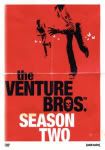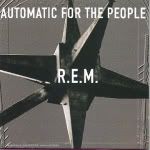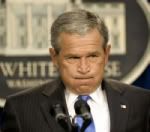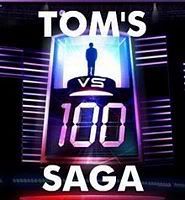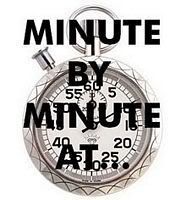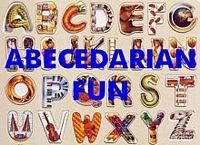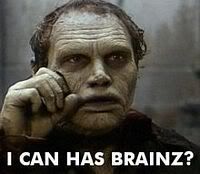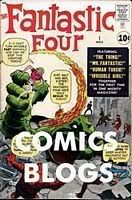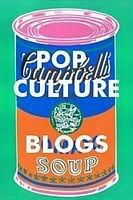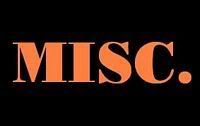The Pussification of the American R-Rated Franchise
The upcoming Live Free Or Die Hard has me thinking about R-rated movies in America. Specifically: if an R-rated movie becomes popular enough to spawn a franchise, that franchise will almost inevitably be juvenilized to reach an even wider audience. Violent, sexy, adult entertainment, if it lasts long enough, will generally lead to watered-down, PG, family fare, either in the film world or another format. Or both.
The Die Hard series is only the latest example. It actually looked like it might be an exception to the rule: Die Hard, Die Harder, Die Hard: With a Vengeance -- all R-rated. And with the last having been made in 1995, for years it looked like the series would stand pat at one perfect little R-rated trilogy.
But why stop at three? So now we have the fourth movie about to premiere. And yes, it's PG-13. Which may make Live Free Or Die Hard the first film in history whose own catchphrase can't be spoken in the movie.
What's the catchphrase to the Die Hard movies? You all know it: "Yippee ki yay, motherfucker." And check me if I'm wrong here, but you can't say "motherfucker" in a PG-13 movie.
That hasn't stopped the marketing campaign from teasing us with the phrase. Watch the end of the trailer at the official site (make sure you turn off the music on that site -- it's loud and annoying, and drowns out the sound from the trailer). It's at the end: "Did you wanna say something?" "Yippee ki yay, mo--"
And check out the "email signature" provided for download at that site:

(John is John McClane, Bruce Willis's character, and 6.27 is the movie's release date.)
And you can also find that truncated phrase all over the movie's MySpace page.
But I'm willing to bet the one place you won't find that phrase -- the full, uncensored phrase -- is in the movie itself.
Yes, you can say "fuck" in a PG-13 movie. More than once, sometimes. (As in The American President, where I believe the F-bomb gets dropped thrice, which may be a record.) But only if it is used purely as an expletive. If it refers to the sexual act -- that's an R. And I'm guessing the MPAA will deem the term "motherfucker" to be inherently sexual in nature (a motherfucker is one who fucks his mother, no?), and thus taboo, which means the movie will wind up cutting away from Willis before he can finish the word, or covering it up with a gunshot or an explosion, or something like that. (Who knows, I might be wrong -- I'll lay odds at 12-to-1.)
Whether or not that word makes it through, the fact that the movie went for a PG-13 in the first place is just another example of the ongoing pussification of the American R-rated film franchise over the past 30 years.
Police Academy may be the most extreme example of this phenomenon. The original film was a hard R-rated raunchfest, featuring, for example, a nude shower scene and a man getting his head stuck up a horse's ass. The second film was PG-13, and the third through seventh (seventh!) films were watered down to an innocuous PG. What's more, the franchise eventually morphed into pure children's fare, including a Saturday morning cartoon:
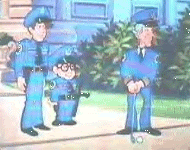
And a comic book based on the cartoon:
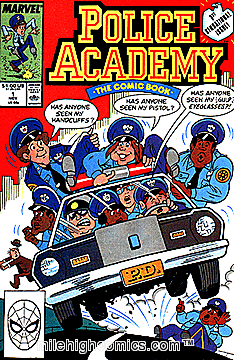
Some of you may be aware of my near-insane love of the original RoboCop, and its legendary ultra-violence. But that franchise suffered a wimpification equally as ignominious as the Police Academy series. RoboCop 2 held on to an R, but RoboCop 3 couldn't even hold on to Peter Weller, let alone an adult rating (it was PG-13). There was also a wimpy live-action TV series, and even worse (shudder)... a children's cartoon. It went from this:
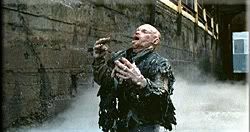
To this:
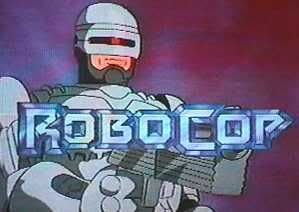
Let's look at some comedies. The Scary Movie series lost its balls with the third installment (and I'm guessing it's no coincidence that's when David Zucker took over as director from Keenen Ivory Wayans). Caddyshack and The Blues Brothers: classic R-rated original films; shitty and unnecessary PG-13 rated sequels. (Though I hesitate to classify films with only one sequel as "franchises.") I could've sworn the third Beverly Hills Cop was PG-13, but it looks like it was actually R.
Looking at a few action series: Mad Max was R-rated, The Road Warrior was R-rated, but Beyond Thunderdome was PG-13. (Side note: if Mel Gibson really wants to win the public back to his side, I think he needs to make another Mad Max movie.) Conan went from R for the first entry to PG for the sequel (and I guess you could count the PG-13 Red Sonja as part of the Conan franchise, even though Schwarzenegger was playing a different character). The Jack Ryan series is most unusual, not just because three different actors have played the lead. The first, The Hunt for Red October, was PG; the second, Patriot Games, was R; the third and fourth, Clear and Present Danger and The Sum of All Fears (forgot about that Ben Affleck one, didn't you?) were both PG-13. I can't think of any other movie franchise which has gone from PG to R (though a few have gone from PG to PG-13). At least it followed the rule and went back to PG-13 for the latter flicks.
Some R-rated franchises pussied out by going the TV-movie route. Revenge of the Nerds, the movie which introduced the phrase "We've got bush!" into the pop culture lexicon, produced two toothless TV movies as parts III and IV (part II, which was a theatrical release, had already been watered down to a PG-13). The Omen, a landmark in modern horror, and R-rated through three theatrical releases, was turned into a weak TV-movie for part four. (The recent remake returned to the series' R-rated roots, thankfully.)
How have other horror franchises fared? Let's see... Terminator? Went through three R-rated movies, but is being turned into the Fox TV series The Sarah Connor Chronicles for 2008. Aliens? Predator? Both of those R-rated series were combined into one PG-13 suckfest, Aliens Vs. Predator. (I know, we all want to pretend that film doesn't exist... but it does.) Blade produced three R-rated theatrical films, but was then turned into a TV series on Spike (all of which, of course, were based on an all-ages comic book to begin with). Even The Toxic Avenger, the low-budget, hardcore gore franchise from the legendarily transgressive Troma Studios, spawned both a kiddie cartoon series and a Marvel all-ages comic book.
The Friday the 13th and Nightmare on Elm Street franchises have always been R-rated, up to and including the one starring both Freddy and Jason. They've never gone soft, right? Wrong! You're forgetting about the syndicated TV shows: Freddy's Nightmares and Friday the 13th: The Series, both of which by necessity had to tame down the sex and violence for the small screen. (Note: there seems to be a question as to whether the Friday the 13th TV show was meant to be connected to the film series at all. The TV show didn't feature Jason, nor any plot connection to the movies; basically, one of the producers of the film franchise ripped off the name for an unrelated TV show. That's still watering down the franchise, in a way, but you can ignore it if you like.)
I find the Matrix trilogy to be a fascinating exception to the general rule. Fascinating in that I believe the second and third movies should have been rated PG-13, but weren't. Think about it: is the F-word used even once in those two films? I'm pretty sure not. I'm also pretty sure there's no nudity (though Monica Bellucci's near-transparent vinyl dress pushes the boundary, bless her heart). And I think the violence, though still present in abundance, was less explicit than in the original film; I know I've seen more gore in PG-13 films -- hell, I've seen more gore on CSI or The X-Files. I'm hard-pressed to see how those two films exceeded the PG-13 standards; perhaps the Wachowskis made it clear that they were looking for an R, and the MPAA granted their wish. (I wouldn't put it past 'em.)
Oh! Wait! There was The Animatrix, the collection of cartoon shorts tied into the Matrix world. That was rated PG-13. Ha! The Matrix is no exception, after all.
Still, there are exceptions; the Godfather saga is one example. But the majority of the exceptions are horror-related. Scream appears to have wrapped things up with an R-rated trilogy. Same with the Evil Dead series. Child's Play is at five R-rated films and counting (which surprised me; I could've sworn the last two were PG-13). Silence of the Lambs has had three R-rated follow-ups, one of which, Red Dragon, was a remake of the R-rated, pre-Anthony Hopkins as Hannibal Lecter Manhunter. Both Hellraiser and Halloween have produced eight movies (though many of them were direct-to-video rather than theatrical), plus the upcoming Rob Zombie remake of the original Halloween, all of which were (or will be) rated R, with, as far as I can tell, no watered-down spin-offs of either franchise. You can probably name a few more yourselves. (Hints: George Romero; Tobe Hooper.)
And American Pie, which was widely credited with reviving the R-rated teen sex comedy genre, made it through two theatrical sequels and (so far) two direct-to-DVD follow-ups, which have all garnered a hard R; this is the only comedy franchise I can think of (aside from Beverly Hills Cop, mentioned above) that's stuck to its guns. (The Porky's trilogy was Canadian, thus exempted from consideration. Those crafty Canadians!! And, okay, there were a million R-rated sex comedy series in the '80s I'm also not considering, since the premise here is that the first film in the franchise was a blockbuster theatrical hit, not a barely-broke-even, made-just-enough-money-to-hire-more-topless-girls sleazefest. Not that there's anything wrong with that.)
You can probably think of a couple more exceptions -- but you can probably also think of many more franchises that follow the rule.
And just why does this happen? Greed, for one, of course; a more family-oriented rating means a bigger potential audience. For another thing, the people behind the original film in a franchise -- the people with the actual vision and creativity -- frequently aren't involved with the follow-ups, leaving assorted jackals and leeches to squeeze every possible nickel out of new, weak product under the old, beloved name.
History shows that most sequels which follow the way of pussification are not very good at all (but then again, most sequels aren't very good, period). Which does not bode well for Live Free Or Die Hard. Despite that, I'll probably go see it (and regret it, because I'm a chump). But what about the rest of you? Does the ratings change for the new Die Hard set off any alarms? Did you even notice? Any franchises left off this list you want to bring up, whether they follow the rule or not? Leave a comment, let me hear about it!



